By Teresa Fausey

BIG PICTURE POLITICS AND CULTURE
The editors of Politico Magazine recently asked several women leaders, “What Are the Biggest Problems Women Face Today?” Although the respondents focused on different specific issues, the general consensus was that, even in the United States, where women have the ability to pursue educational and career opportunities, greater access to money and credit, more independence and mobility, and entrée to the political system, they continue to face deeply entrenched, and sometimes insidious, roadblocks to growth, success, autonomy, and freedom.
According to Keisha N. Blain, who teaches history at the University of Pittsburgh and is author of Set the World on Fire: Black Nationalist Women and the Global Struggle for Freedom, the biggest challenge facing women in the United States today is patriarchy, especially in politics. Blain says that “regardless of a woman’s experience, education, or abilities, the patriarchal nature of U.S. society fosters the perception that women are less qualified and less competent than men. What patriarchy has done is convince people that a strong and intelligent woman represents a problem; a disruption to the social order rather than an integral part of it.”
Rebecca Traister, a writerat- large for New York magazine and The Cut, also sees specific issues as representative of a larger, systemic problem, an “extremely potent combination of sexism, racism, and economic inequality…. All of the individual challenges we may be tempted to rank are symptomatic of these massive systemic power imbalances, working in tandem.”
Center of American Progress President Neera Tandan voiced even more dire concerns regarding the overarching forces affecting women in the political domain. “The greatest challenge confronting women in America,” she says, “is a campaign to normalize misogyny and take women’s rights backward.”
However, at least in the workplace, there is some good news.
EMPLOYERS GET IT
Although business entities, and other organizations, vary in their approach to gender equality and support for women, with some going all in and others resisting any substantive change, it’s surprising and gratifying that so many large corporations and nonprofits are taking the lead in this area. Not only are these entities committed to doing the right thing, they understand that their commitment to gender equity also works to the organization’s advantage. Clients demand workforce diversity in vendors, suppliers, and consultants, while companies with diverse workforces are more innovative and more profitable. Gender equity is a case of doing well by doing good.
A LOOK AHEAD—2019
According to “5 Predictions For What Women Will Experience In The Workplace In 2019,” written by Fairygodboss CEO and Forbes Women contributor Georgina Huang, and posted January 22, 2019 by Forbes.com, women can look forward to five key changes in the workplace. What follows is a condensed version of those changes:
- More employers will start taking actions to improve gender diversity at work, which may take the form of hiring more women, starting employee resource groups for women, or improving benefits and policies intended to attract and retain women.
- Employees will organize more often and more effectively to create change. In 2018, we saw more employees organize in the form of public walkouts and open letters to management. In 2019, we can expect this trend to continue and grow.
- Sexual harassment will remain in the news, which will create conversation in the workplace. However, many employers will probably continue to make incremental changes.
- Historically unprecedented female representation in Congress, and in politics generally, may mean legislative changes more supportive to women at work—especially, policies related to childcare or family leave.
- Women will continue to see progress on boards—an outgrowth of the progress for women on boards in the past couple of years, with African-American women and Asian women in particular making inroads.
All in all, things may be looking up for U.S. women at work in 2019. Of course, progress in the work, political, and personal lives of women will continue to require each of us to step up, speak out, and reach higher.
Luckily, women are always up to the challenge.
AMERICAN WOMEN FIRSTS
(collected from Wikipedia)
1647: Margaret Brent – first American woman to demand the right to vote.
1739: Elizabeth Timothy – first woman to print a formal newspaper and the first female franchise holder in the colonies.
1756: Lydia Taft – first woman to vote legally in Colonial America.
1776: Margaret Corbin – first woman to assume the role of soldier in the American Revolution and receive a pension for it.
1784: Hannah Wilkinson Slater – first American woman granted a patent.
1845: Lowell Female Labor Reform Association opened in 1845 as the first major labor union.
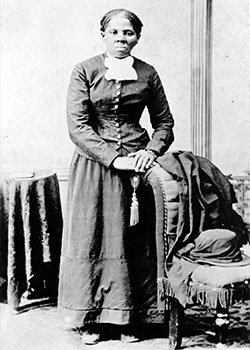
Harriet Tubman
1850: Harriet Tubman – first American woman to run an underground railroad to help slaves escape.
1869: Arabella Mansfield – first female lawyer in America; admitted to the Iowa bar.
1870: Louisa Ann Swain – first woman in the United States to vote in a general election.
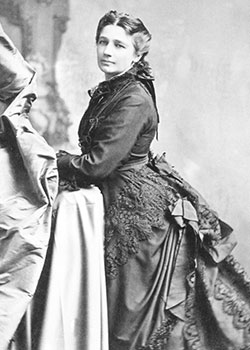
Victoria Woodhull
1872: Victoria Woodhull – first woman to run for United States President.
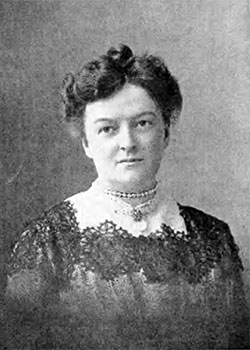
Carro Clark
1900: Carro Clark – first American woman to establish, own, and manage a book publishing firm—C. M. Clark Publishing Company.
1916: Jeannette Rankin – first woman to hold high office in the United States—elected to Congress, as a Republican from Montana.
1920: Marie Luhring – first woman in America to become an automotive engineer.
1923: Florence King – first woman to win a case before the U.S. Supreme Court (Crown v. Nye).
1933: Frances Perkins – first woman cabinet member (Secretary of Labor), under Franklin Roosevelt.
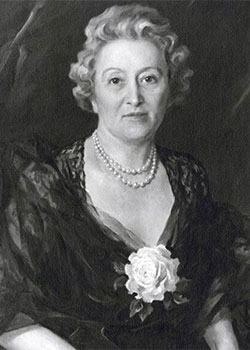
Lettie Pate Whitehead
1934: Lettie Pate Whitehead – first woman to serve as a director of a major corporation (The Coca-Cola Company).
1942: Anna Leah Fox – first woman to receive the Purple Heart (wounded in the attack on Pearl Harbor).
1948: Esther McGowin Blake – first woman in the U.S. Air Force.
1955: Clotilde Dent Bowen – the U.S. Army’s first black female physician to attain the rank of colonel.
1959: Arlene Pieper – first woman to officially finish a marathon in the United States when she finished the Pikes Peak Marathon in Manitou Springs, Colorado.
1963: Maria Goeppert Mayer – first American woman to win a Nobel Prize in Physics; she shared the prize with Eugene Paul Wigner and J. Hans D. Jensen.
1964: Isabel Benham – first female partner in R.W. Pressprich & Co.’s 55-year history, which also made her the first female partner at any Wall Street bond house.
1972: Katharine Graham – first female Fortune 500 CEO, as CEO of the Washington Post Company.
1976: Emily Howell Warner – first woman to become an American airline captain.
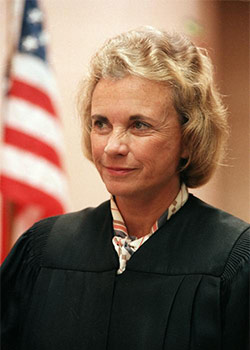
The Honorable Sandra Day O’Connor, justice of the U.S. Supreme Court, is shown, June 24, 1985. (AP Photo/Lana Harris)
1981: Sandra Day O’Connor – first woman United States Supreme Court justice.
1985: Libby Riddles – first woman to win the Iditarod.
1994: Judith Rodin – first permanent female president of an Ivy League university (University of Pennsylvania).
1999: Carly Fiorina – first woman to lead a Fortune 50 company (Hewlett-Packard)
2000: Lucille “Pam” Thompson – first African-American woman to be a U.S. Coast Guard Special Agent.
2009: Jeanne Shaheen – first woman to hold the offices of Governor (New Hampshire, 1997–2003) and U.S. senator (New Hampshire, since 2009).
2016: Adena Friedman – first female CEO of NASDAQ.
2018: Stacey Cunningham – first female President of the New York Stock Exchange.
The achievements listed here include gains in business, education, politics, athletics, the military, science, and more. Some were outliers—one-time wins for one specific woman, not to be repeated for years. However, every gain made helped pave the way for the next generation of women to move the sticks down the field toward the ultimate goal.
Women today are stepping up and stepping out as never before. They are also working together and organizing as never before. And we are seeing the results—as never before.






